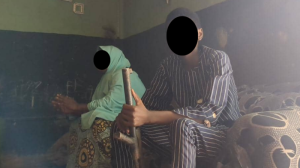The claim by the host of Brekete family radio programme, Ahmed Isah aka ‘Ordinary President’, that the Human Papilloma Virus, HPV, vaccine is harmful and targeted at depopulation lacks evidence and is misleading, a PRNigeria fact-check has discovered.
The Ordinary President, in a video clip during a live broadcast of his popular Brekete family programme of Human Rights Radio Station in Abuja, claimed that the HPV vaccine is harmful to girls and targeted at reducing the population of Nigerians. https://prnigeria.com/2023/11/01/hpv-vaccine-brekete-family/
But in order to verify the authenticity of the claims by Ahmed, PRNigeria fact-check team ran a background check on the video, which originally came from Brekete Family radio station.
PRNigeria fact-checkers then used toggled keyword searches to cross check claims about advance global economies not having a vaccine or cure for cervical cancer.
Investigative results took us to a report by global cancer burden studies which revealed that China has the second highest incidence and mortality rate of cervical cancer worldwide, with around 110,000 new cases and 59,000 deaths. Cervix cancer remains a major public health issue in China. Furthermore, over the past few decades, a growing number of studies show that certain head and neck cancers (HNCs), mainly oropharyngeal cancers, are associated with HR-HPVs, especially type 16.9. Sabatini and Chiocca indicate that there has been a 37% increase in HNCs incidence globally over the past decade.
Heralded as a huge step forward, further investigation revealed that the first domestically manufactured HPV vaccine (Cecolin™) was approved in China in December 2019 and pre-qualified by WHO in October 2021. Hereafter, China has become the third country capable of producing HPV vaccines worldwide.
Also in the UK, the National Health Service (NHS) which is a comprehensive public-health service under government administration, established by the National Health Service Act of 1946 and subsequent legislation showed that the HPV vaccine is recommended for children aged 12 to 13 years old and people at higher risk from HPV. All children aged 12 to 13 (school year 8) are offered the HPV vaccine. If girls missed getting vaccinated when they were 12 or 13, the HPV vaccine is available for free on the NHS for all girls under 25.
Similarly, in the US, cervical cancer vaccine is a regular exercise. According to the Centers for Disease Control and Prevention (CDC), the HPV vaccine is recommended for routine vaccination at age 11 or 12 years, but it can be given starting at age 9 years. All preteens need HPV vaccination, so they are protected from HPV infections that can cause cancer later in life.
In addition, further investigation revealed the significance of administering the HPV vaccine during the infant stage. According to Saudi Gazette report in RIYADH, Saudi Arabia‘ Ministry of Health reiterated the importance of giving the girls the Human papillomavirus (HPV) vaccine at an early age.
In a statement, the MoH said that “it is important for families to ensure that their daughters receive the HPV vaccine at an early age to contribute to protecting them from cervical cancer.
The vaccinations that girls will be receiving at an early age contribute to raising their immunity, as well as increasing protection against HPV”, MoH confirmed.
Girls from 9-14 years old are given two doses of the HPV vaccination before they are exposed to the virus, and three doses for the age group of 15 years and over.
Other findings on HPV vaccine revealed the United Nations (UN) report on the effectiveness of HPV vaccine, especially in Nigeria and Africa at large.
PRNigeria fact-check observed that the HPV vaccine is not only in Nigeria It is available in many countries around the world, including the United States, Australia, and most of Europe. The HPV vaccine is safe and effective at preventing HPV-related infections and cancers.
Findings by PRNigeria reveal that the HPV vaccine is not being piloted in Nigeria as claimed but is developed and actively in use by other countries of the world including China, UK, US and Saudi Arabia among others. Concerns about its safety and efficacy have also been addressed by medical experts, academic journals and the World Health Organisation.



